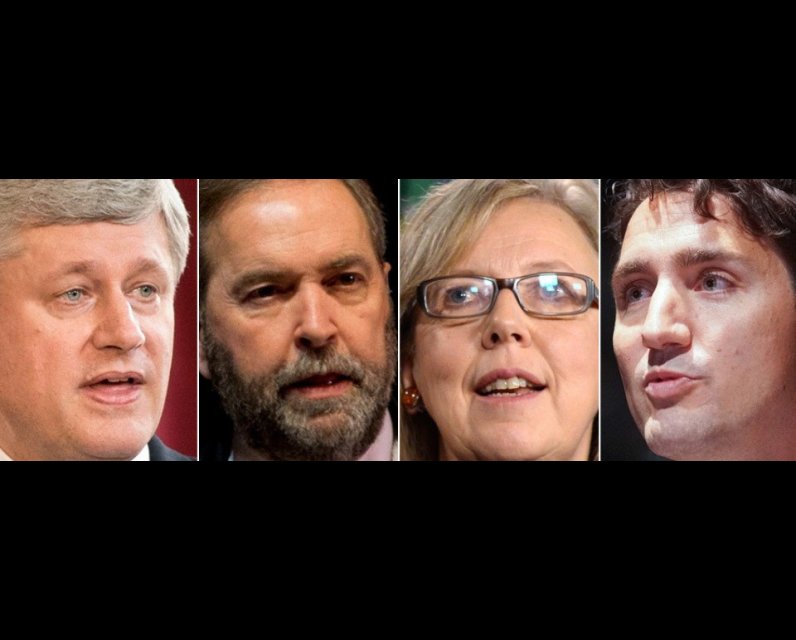Unpublished Opinions
I am the founder of Unpublished Media Inc., a company I started in 2012. I am also a communications professional and community activist, living in Nepean, Ontario. And, I am a hockey goaltender, political hack and most importantly, an advocate for grassroots, participatory democracy at all levels of government.
Voting Strategically? Go with your gut

I have been appalled by the interference in this election campaign by special interest groups lobbying for Canadians to vote strategically--or more accurately--to vote Liberal. It is a scam that is unworthy of our nation.
Dear Canadians,
In this election much has been made of the need for anti-Harper voters to vote strategically in the federal election. The argument goes that if we want to defeat the Conservative Party, all anti-Harper voters need to pick one opposition party to get behind. Because the Liberals are the traditional main challenger in many ridings, especially here in Ottawa-area ridings, it follows then that anti-Harper voters should vote Liberal.
Lead Now, a national lobby group, has teamed up with local organizations around the country like Ecology Ottawa, an environmental lobby group in Ottawa, and a national pollster to conduct small sample size polls in local ridings in order to convince voters to vote strategically for the Party that has the best chance of defeating the Conservative candidate in a particular riding.
They have even engaged in door-to-door and phone canvassing, and have attended all-candidates debates handing out flyers and side-swiping local candidates and campaigns to put forward what essentially amounts to a pitch to vote Liberal, for the simple reason that the Liberals, according to their questionable polls, have the best chance of defeating the Conservatives.
While I understand Lead Now’s objectives, I do not believe that special interest groups should be allowed to participate in election campaigns. Its not their place. Elections are the time and place for political parties to make their case to voters, not the time for one issue groups whose funding is reliant on their issue becoming important, to muddy the waters and mislead voters.
This is especially true for groups like Ecology Ottawa who have raised money from Ottawa area residents on the premise that they oppose the Energy East pipeline, a project the Liberal Party supports. It’s a rather obvious conflict of interest which makes me wonder if Ecology Ottawa has a hidden agenda that has nothing to do with the environment at all? Not only is Ecology Ottawa’s participation a real black eye for the environmental movement in Ottawa, but the real danger lies in the fact that these special interest groups have mislead voters in across the country about where the three opposition parties stand on a whole slew of issues.
With the naiveté of a child, the "Vote Together" campaign makes the false assumption the three opposition parties are interchangeable--that their platforms and approaches to governing are the same. At this late date in the campaign it should be clear to most voters that this is not the case. Each opposition party has its own, very distinctive policy platform. While the Green Party and NDP have similar objectives in many policy areas, they take a very different approach to achieving their objectives.
The Liberals however, are much closer to the Conservatives than the NDP or Greens on major files like the Trans Pacific Partnership, Bill C-51, Senate reform, foreign and military policy, trade policy and agreements, the expansion of the oil sands and the building of pipelines like Keystone XL, Kinder Morgan and the Energy East pipeline.
This was made very clear Wednesday evening when Dan Gagnier, the Liberal Party's Campaign Co-Chair, resigned from his post because of revelations that he'd sent a detailed email to people at TransCanada, the company behind the Energy East pipeline, with advice on how and when to lobby a new government. The email included advice on how TransCanada could go about lobbying a minority government led by Justin Trudeau. The same Justin Trudeau who flew to Washington to inform US President Barrack Obama of his support for TransCanada’s proposed Keystone XL pipeline.
Despite Justin Trudeau’s promise to do things differently, Dan Gagnier’s email to TransCanada proves once again that the Liberal Party can not be trusted to act in a transparent and accountable manner, and that it certainly does not represent the “Real Change” they claim to represent. It also proves, that despite Trudeau’s rhetoric to the contrary, the Liberal Party is not prepared to do what it takes to reduce Canada’s carbon footprint.
And, while these issues may not be the ones that decide how voters cast their vote on October 19, the policy differences between the Liberal Party, the NDP and the Green Party are too different to be ignored. In particular, the Green Party policies are all based on six values originally crafted by the Global Greens (globalgreens.org). Like all Green Parties, the Green Party of Canada is part of a global network of Green parties around the world advocating for a society based on the principles of sustainability. No other party in Canada comes close to the Greens when it comes to the environment.
“Voting Together” has a catchy rhythm to it and while the idea of ridding Canada of Harper is certainly on the tip of 70% of Canadian’s tongues, it is nevertheless, a fallacy—an incorrect and naive argument based on the false assumption that it doesn’t matter which party wins the election as long as it is not the Conservative Party.
People vote for many reasons. Some vote strategically against a party or leader, but I’d like to think that most people vote for the Party, leader or local candidate that resonates best with them. Voting strategically has never really caught on in Canada, despite Lead Now’s push to do so, because it fails to address the question ‘What happens after the campaign’?
None of these parties have agreed to work together. There is no assurance that the Liberal Party will follow through on the many, many promises it has made during this campaign. And, if the environment is important to you, then you need to know that the Liberal Party’s record to date is quite dubious. Environmentalists know Jean Chretien did nothing to live up to Canada’s obligations to reduce our carbon footprint in the Kyoto Accord.
If you’ve decided not to vote Conservative in this election, but, after having done your research, you are still unsure how to vote, I recommend going with your gut—your first instinct. Your first instinct is always correct because its your gut telling you who or which party best resonates with you. So, think back to the first time you thought about this election. What picture flashed into your head? Whether it was a local candidate or a particular party leader, that’s the person who you should vote for because that was your first instinct.
Good luck everyone! Whomever you vote for, please make the effort to vote. Active participation in our electoral system is the best way for Canadians to ensure our democracy continues to evolve the way we, Canadians--not special interest groups, want it to.
Sincerely,
James O’Grady
James O’Grady is the founder of UnpublishedOttawa.com, a social media website for current affairs in Canada



Comments
Be the first to comment